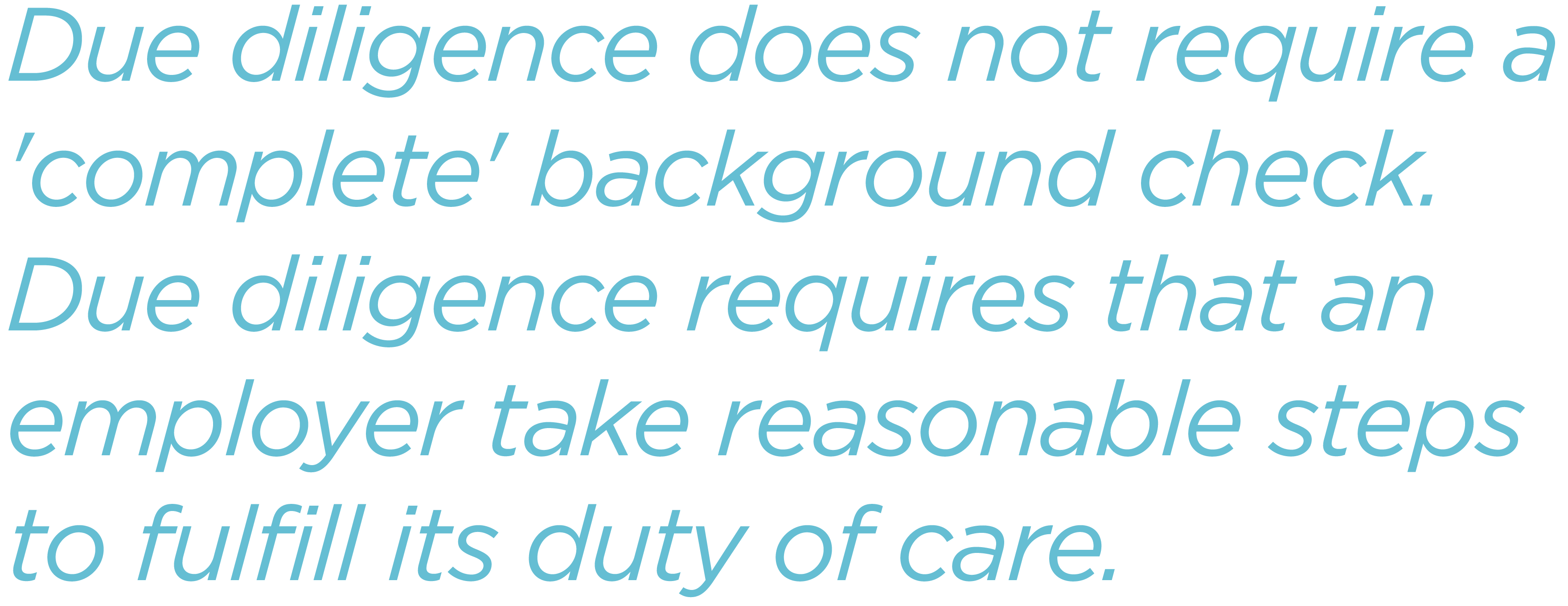Know Before You Hire: Three Employment Screening Trends in 2021
Security Management has partnered with SHRM to bring you relevant articles on key workplace topics and strategies.
The COVID-19 pandemic will continue to impede aspects of employment screening in 2021, leading employers to use alternative procedures such as conditional hiring and remote drug testing.
“The good news for employers is that as the economy opens back up, courts reopen, and employers and schools resume more normal operations, these issues become self-solving,” said Les Rosen, attorney, speaker and the CEO of Employment Screening Resources, a background-screening firm in Novato, California. “In the meantime, employers cannot stand still just because the system is less than perfect. Keep in mind that due diligence does not require a ‘complete’ background check. Due diligence requires that an employer take reasonable steps to fulfill its duty of care.”
Experts also believe that more lawsuits over criminal records accuracy will be filed in the years ahead, and the adoption of continuous monitoring will continue to advance as remote and gig workforces grow.
Court Closures Brought Screening to a Halt
COVID-19 wreaked havoc on the background-screening industry in 2020, said Melissa Sorenson, executive director of the Professional Background Screening Association (PBSA). “Without access to courthouses, employer and education records, the ability to verify the background of a candidate for those entities that were hiring essential workers was very difficult, delayed, and in some cases impossible.”
Now, access to physical court records has largely been restored, though there will continue to be isolated closures or reduced hours, said Kevin Bachmann, an employment-screening consultant and host of Background Check Radio, a podcast focusing on employment-screening issues. “The pandemic shone a bright light on a decades-old problem however, which is limited digital access to public record information,” he said.

Christine Cunneen, CEO of Providence, Rhode Island-based background-check company Hire Image, said that the impediments brought on by the pandemic will continue in 2021. “Court closures remain in jurisdictions with increased COVID-19 cases,” she said. “Some courts have restricted access to records or have placed time restrictions under which to obtain records. While there are workarounds in some instances, these closures and delays often impact the timing of criminal searches.”
She said that employment and education verifications are also still affected because in many cases staff are working remotely and do not have the requested information available.
Dr. Todd Simo, chief medical officer and managing director of transportation at Irvine, California-based screening provider HireRight, said that while some courts in major metropolitan areas are still experiencing a backlog, fulfillment of public records requests and employment and education verifications has largely recovered from the early-pandemic closures and HireRight's drug-testing network “is up and running, essentially the same as before the pandemic.”
In addition, many employers and educational institutions have modified their workflows to address verifications processes during the pandemic, he added.
“With that said, fulfillment of background requests is still a fluid situation, and if there is a pandemic resurgence, I would expect the same types of closures,” Simo said.
Employers Ramped Up Contingent Offers
Sorenson said that throughout the pandemic, background-screening firms worked with their employer clients to identify interim workflows that allowed the employer to hire people contingent on the results of their background check coming back at a later date.
“In industries with accelerated hiring needs, like healthcare, and in retail and hospitality where we’re seeing a lot of rehiring, it’s vital that offer letters are clear and unambiguous about the status of a background check,” added Tim Dowd, CEO of Accurate Background, a screening firm in Irvine, California. “We recommend that they include language that specifically states that the offer of employment is contingent and conditioned upon the successful completion of a background check, which may occur prior to or after the start date.”
Drug Testing Slowed
Dowd also noted that medical labs in 2020 prioritized COVID-19 testing, causing further delays for employers who conduct drug screens.
“COVID-19 will continue to have tremendous impacts on how, when and where drug screenings are performed,” Cunneen added. “Many people are reluctant to go for drug testing at a facility that also conducts COVID-19 testing in fear of contracting the virus.”
Cunneen said that employers should review and rewrite their drug policies and protocols, and determine alternative solutions for drug testing, such as remote oral fluid testing.
“Testing kits can be sent to applicants at their homes allowing them to provide a sample, which can be monitored through teleconferencing options,” she said. “The samples are then sent back to the testing laboratories, eliminating the need for in-person testing in many situations.”
Technology will be the key to successfully testing in remote-work situations, said Jared Rosenthal, founder and CEO of Health Street, a drug and alcohol testing provider in New York City. “Find a drug-testing company that can automatically send a registration barcode to your new hire’s phone. Find a background-check company that allows applicants to scan in their driver’s license and e-sign their waivers. Find software that integrates as many of these services as possible into a single employee record.”
Accuracy Will Get More Attention
The accuracy of criminal records used in employment screening will become an emerging area of litigation. Rosen, who has noted this trend in recent years, explained that under the Fair Credit Reporting Act (FCRA), all screening providers must “follow reasonable procedures to assure maximum possible accuracy of the information concerning the individual about whom the report relates.”
Before COVID-19 upended regulators’ plans for 2020, agencies such as the Federal Trade Commission and Consumer Financial Protection Bureau were gearing up to examine the accuracy of background checks more thoroughly.
“With unemployment almost twice as high as this point last year, it’s fertile ground for plaintiffs’ attorneys,” Bachmann said. “If an inaccurate report was the reason an unemployed person did not get a job, that creates both litigation risk and bad PR for the employer and screener alike. And there’s both more unemployed people and more media appetite for reporting personal stories of those negatively affected by the current economic climate.”
He added that any discussion of accuracy needs to cover preventing both false positives and false negatives.
Sorenson said that the primary ways to decrease false positives and negatives include using databases that allow for more-targeted searches; expanding searches to allow screeners to report all convictions so that employers can make informed decisions; requiring the federal court system to provide more critical identifiers, like date of birth; and developing guidance for how to deal with common names.
“Additionally, employers should have policies that outline lawful practices regarding employment-related decisions that detail use and consideration of criminal records and incorporate these safeguards into their procedures,” Dowd said.

It’s also up to employers to ensure that the records they examine are relevant to the job for which they are hiring, Rosenthal said. “If you’re concerned about not perpetuating historical biases, try to focus your background checks on specific concerns about someone’s past that would absolutely bar them from getting hired, rather than broadly eliminating any applicant with any blemishes in their background. And for those with prior criminal records, consider the amount of time that has passed since the incident before making a blanket decision to rescind your offer.”
Continuous Screening Will Grow
Continuous screening (also called continuous monitoring)—in which criminal records checks are run daily, weekly, monthly, semi-annually or annually on employees and contractors—will continue to attract attention from employers.
“Particularly in light of the increased remote workforces around the country, more companies are realizing the importance of monitoring employees for indications of illegal behavior,” Cunneen said. “Employees represent a company's brand, and now often are needed to do so from home.”
These periodic checks can give a business the opportunity to identify criminal conduct that can occur after a person is hired, Rosen said. But employers need to also understand the potential limitations and compliance obligations of continuous screening, including accuracy, consent, confirming data at the primary source, permissible purpose, U.S. Equal Employment Opportunity Commission considerations, FCRA issues, and impact on the workforce.
“Even though continuous screening may have some apparent advantages, employers still need to determine if they outweigh the disadvantages,” he said.
Employers should make sure that workers being monitored are provided with disclosures that background screening will be ongoing and that those workers have consented to ongoing authorization for those checks.
Policies should reflect clearly when the screenings will occur and why and apply equally to all employees, Cunneen said.
Roy Maurer covers talent acquisition, immigration, HR technology, and labor markets for SHRM Online.
© 2021 SHRM. This article is reprinted from SHRM.org with permission from SHRM. All rights reserved.
